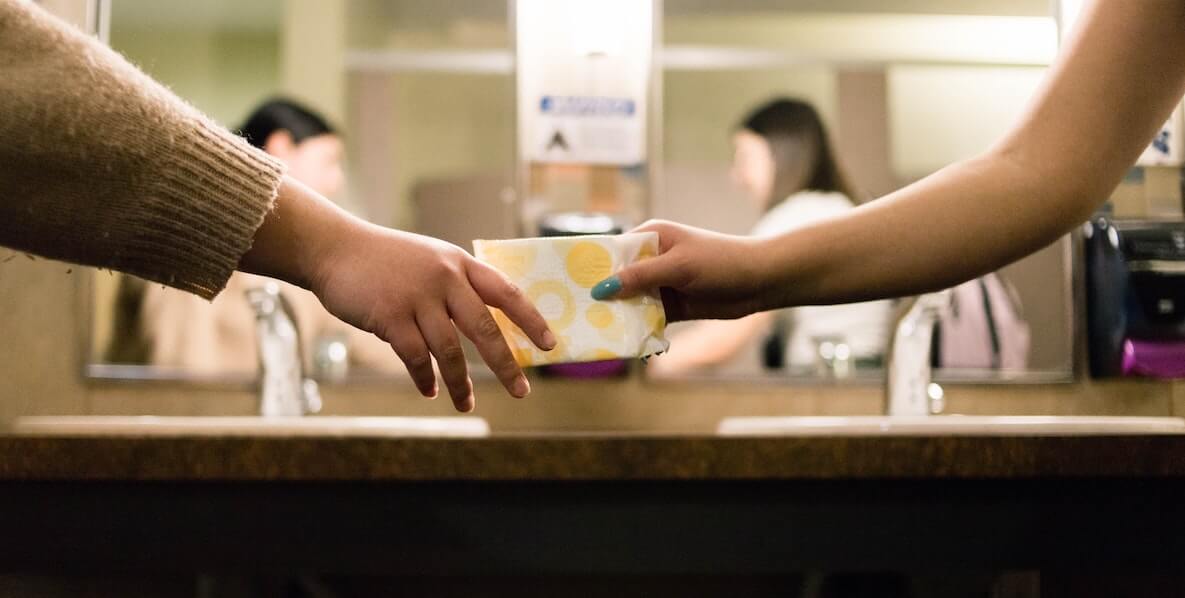“I have to miss school next week because I’m getting my period; I don’t have money to buy supplies, and the shelter and school don’t have any.” I was shocked by my 13-year-old patient’s words.
I am a pediatrician, and my colleagues and I provide medical care at family shelters as part of our institution’s partnership with Philadelphia area shelters. This was not a reason for missing school I had ever considered.
I was able have pads shipped to the shelter for my patient, and I asked our partnership’s Social Work Leader whether she had encountered this situation with other shelter residents; she confirmed it was all too common. “Period products are expensive, and shelters are dependent on donations to provide products to their residents. Most people don’t think to donate pads and tampons.”
October 9th is Period Action Day, an international call to action to end period poverty, or lack of access to menstrual products. Over 500 million menstruating adult and children worldwide lack access to period products. The United States is also plagued by period poverty. A large study in St. Louis demonstrated that approximately 67% of menstruating adults of low socioeconomic status are unable to consistently afford menstrual supplies; nearly half reported being forced to choose between buying food and period products. Adults living in shelters cite lack of menstrual products as barriers to attending job interviews.
“I have to miss school next week because I’m getting my period; I don’t have money to buy supplies, and the shelter and school don’t have any.” I was shocked by my 13-year-old patient’s words.
Adolescents also experience period poverty at devastatingly high rates, with 1 in 4 US teens reporting they have struggled to afford period products and 1 in 5 teens stating they’ve had to miss school because they could not afford the menstrual supplies they needed. Educational attainment and employment are critical to breaking the cycle of poverty; lack of affordable access to period products hinders the progress of children and adults alike.
Period poverty exacerbates existing health disparities- it disproportionately impacts Black and Latinx children and adults– and it can make you sick. Lack of access to menstrual products can lead to use of products for inappropriately long times, which is a is a known risk factor for development of menstrual toxic shock syndrome, a life-threatening disease, as well as urinary tract infections.
Why does period poverty exist in a nation where products abound? Menstrual products are expensive, and in 27 states, they are taxed. To make it worse, period products are not covered under federally funded initiatives combatting poverty such as WIC (Women, Infants, and Children) and SNAP (Supplemental Nutrition Assistance Program) meaning people living in poverty have no support in purchasing these products. In most states (including Pennsylvania) essential safety nets including schools and shelters are neither required nor given funding to provide menstrual supplies.
Addressing period poverty is a fundamental step in breaking the cycle of poverty and ensuring equitable access to education and employment- policymakers must act by:
-
-
- Passing The Pennsylvania Menstrual Health Equity Act (SB 956), which would require schools, colleges, shelters, agencies providing food and housing assistance, correctional facilities, and local, state, and federal government programs supporting people of low socioeconomic status to provide free disposable menstrual products in all restrooms. Lilly’s Bill would require all schools to provide products of at least two absorbencies.
- Passing legislation allowing WIC and SNAP to be utilized to purchase menstrual products; Illinois has already taken this step, and we can encourage our Congressional Representatives to do the same.
- Ending the “tampon tax,” or the sales tax on menstrual products. You can see whether your state taxes period supplies here and contact your Congressional Representative. Thankfully, Pennsylvania has taken this step!
-
In addition to encouraging our legislative officials to act on the policies outlined above, we can all make a difference by donating menstrual supplies to local shelters, and by supporting organizations that supply products to people in Philadelphia who are unable to afford them.
My patient courageously sharing her experience with me has impacted hundreds of menstruating teens and adults—my colleagues and I have since started a grant-funded partnership with local shelters through which we provide monthly shipments of menstrual supplies. This Period Action Day, I hope she can similarly inspire us all to do our part in ending period poverty.
Rebecca Whitmire is a pediatric resident physician.
The Citizen welcomes guest commentary from community members who stipulate to the best of their ability that it is fact-based and non-defamatory.



